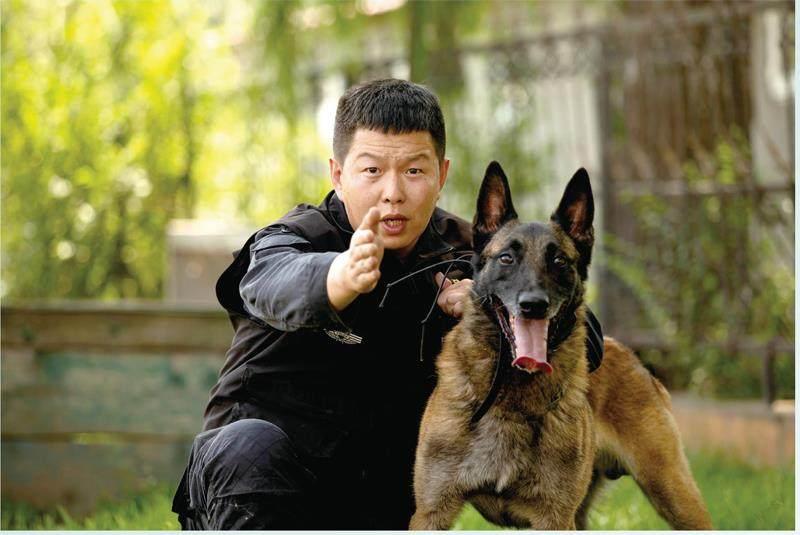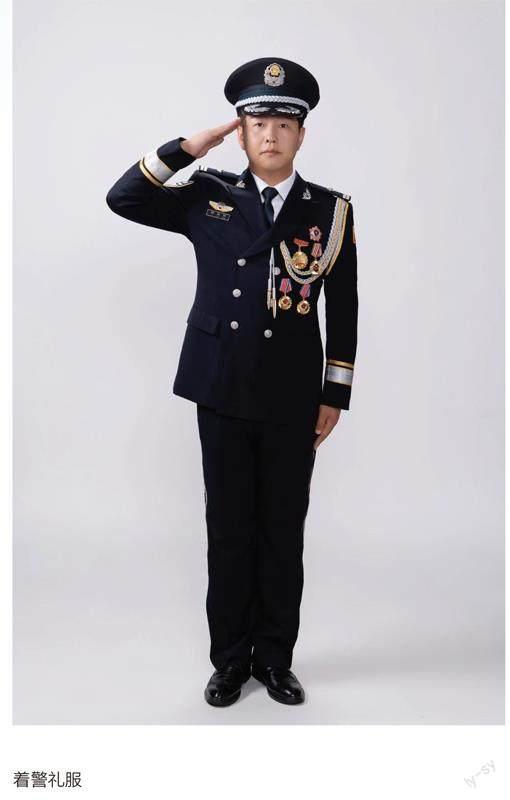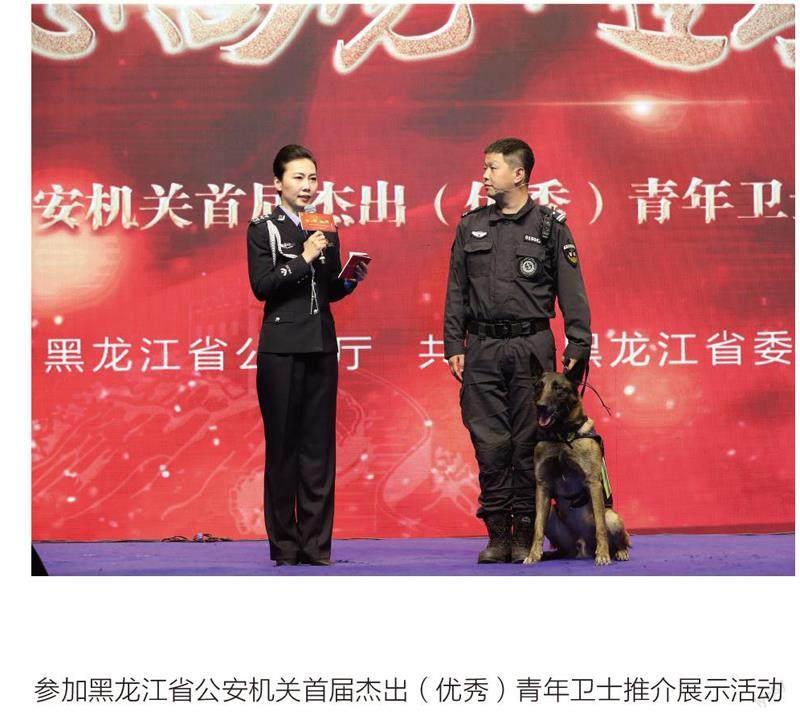警犬训导员路博阳
宋晨 黄庆



清晨6点,在远离城市喧嚣的城乡接合部——黑龙江省哈尔滨市道里区薛城路警犬基地,一人一犬正在緊张地训练,坐、卧、立、搜、踪、袭……他们已经训练了一个多小时了。从清晨到黄昏,从酷暑到严寒,这是他们的常态,也是他们的坚守。
这名警犬训导员名叫路博阳,2012年毕业于中国刑警学院警犬技术系,入警后,一直在黑龙江省哈尔滨市公安局刑事技术支队警犬技术大队从事训犬工作。作为战斗员,路博阳亲手训练出考本、无敌、尼莫3头公安部功勋犬;作为指挥员,他带领全队训练出功勋犬总计10头。36岁的他,曾荣立个人二等功1次,先后被评为2022“最美基层民警”、全国优秀人民警察等。
“训犬没有通用教材”
路博阳与功勋犬考本结缘在2015年。
好犬如烈马。那时候,考本只有6个月大,刚刚断奶就送给路博阳一个“见面礼”——在他手臂上留下令他疼了好几天的一排牙印。接下来,一连几个月, 路博阳每天24小时围着考本转,熟悉、照顾并对它进行启蒙训练。在训练场上,路博阳不仅琢磨考本的脾气,还研究考本的习性,以此有针对性地制定训练方案。为了集中精力训出功勋犬,路博阳放弃了自考本科的考试——这也是“考本”名字的由来。路博阳不服输的性格潜移默化地感染着考本,人拼犬也拼,一拼到底。
寒来暑往,光阴不负汗水。2018年,路博阳带着考本参加5年一届的全国警犬技术比赛。在100多对参赛选手的激烈角逐中,路博阳和考本崭露锋芒,脱颖而出,以超过第二名4倍速度的绝对优势夺得室内搜捕项目冠军。
“世界上没有一本训练警犬的通用教材。因此,要训练好一头优秀的警犬,不仅需要脑力,还要付出体力。”路博阳说。
路博阳最初带了6头犬,大的两三岁,小的几个月。这些犬来自不同国度,性情、眼神、动作各不相同。但有一点是相似的,那就是瞳孔。从警犬技术系学到的理论,加之反复实践,路博阳积累了看瞳孔识情绪的经验。如果犬的瞳孔放大,说明它心不在焉。这时,无论使出什么招数,训练成效都不理想;如果犬的瞳孔缩小,说明它精力集中。这时,只要按规定科目进行,训练成效就会事半功倍。
路博阳说,警犬把每次训练和执行任务都当作“玩”,在这个“玩”中获得食物奖励,是警犬的最大欲望。为了满足和刺激警犬的这种欲望,高质量完成每一次任务,路博阳在每次训练后和执行任务中,都要带上“奖食”,择机给警犬投喂以示奖励。“奖食”由牛肉、鸡蛋、狗粮搅拌后,制成元宵形状,警犬见到这个“元宵”立刻垂涎欲滴,为了获得这口奖励,就卖力地干活。
“判定一头执行任务的追踪犬是否接近目标,需要盯住它的尾巴。不管是长尾巴还是短尾巴,如果摇摆得越来越快,说明它已发现目标。”一说起警犬技术,路博阳就滔滔不绝。
有一年秋天,某地发生一起纵火案,把一村民的苞米地烧个精光。路博阳带着硬质地面追踪犬新星执行任务。通过外围提取的足迹气味,新星顺线追踪,七拐八拐,终于闯进一座土房,在炕沿下面叼起一双沾满泥土的解放胶鞋。这时,新星的尾巴越摇越快,很是兴奋,路博阳心里就有谱了。果然,经审讯, 确认了这家男主人就是放火者。
山林搜捕一度是搜捕警犬训练的弱项。2015年10月至2016年3月,路博阳和其他地区的9名警犬训导员参加公安部全国山林地搜捕研究班,目的是为更加有效地开展此类训练提供理论指导。路博阳在此期间,撰写论文《犬的猎捕动力与防御动力及转换时机的把握》,被《中国工作犬业》杂志刊发。路博阳还研发出警犬多功能气味搜索训练箱,无偿向全国警犬技术行业提供技术支援。经过多年的努力,路博阳的警犬技术日益提升,入选全国警犬技术人才库,成为公安部搜捕犬特聘教官、公安部刑事技术青年人才。
多跑细搜总会找到线索
“训练是基础,实战是目的。让警犬在打击犯罪中发挥作用,是每位训导员最大的心愿。”路博阳有一股狠劲儿、一股犟劲儿和一股钻劲儿,他坚信,只要他和警犬多跑一次、细搜一点,就会找到案件线索。
2018年,某区发生命案,社会影响极其恶劣。路博阳带队追踪17公里,3头追踪犬接力追踪,连续两天两宿高强度作战,终于成功锁定犯罪嫌疑人的逃跑路线;2014年,在一起室内杀人抛尸案中,路博阳带犬进行室内搜索,在不足20平方米的地方搜索了几百次。最终,发现了一小块残留血迹,经过比对直接认定了杀人第一现场;2020年9月,在一起强奸幼女案中,犯罪嫌疑人乘坐公交逃离现场,路博阳带犬在作案现场获得嗅源,为快速侦破案件指明了追踪方向……
多年来,路博阳在执行追踪犯罪嫌疑人、鉴别物证、搜索、押解看守、巡逻、警卫等警务任务中,和他训练的功勋犬密切协作,屡屡发挥关键作用。
当上副大队长后,由于分管业务工作,路博阳的工作量加大了,凡是与业务有关的,他都当仁不让,处处带头。不说别的,单说每年300多次的排爆安检,就够路博阳忙的,多年来,大队这项工作无一次失误。不论白天黑夜,只要接到任务,路博阳立刻带犬出征,一次次出色地完成任务。十多年来,路博阳带犬共计参加安检警卫和大型活动保卫任务4000多场次,利用警犬提供破案线索80多条,成功破案45 起。
路博阳与犬结缘是从童年开始的。那时候,路博阳外公养了一头不知道是什么品种的犬,后来外公去世,那头犬不吃不喝最终饿死在门前。忠犬可以为主人舍命,这让懵懂的路博阳非常震撼。从那时候起,他深深地喜欢上了这种忠诚的动物。于是,路博阳报考中国刑警学院时,毫不犹豫地选择了警犬技术专业。
选择容易坚守难。路博阳说,训练警犬工作,三年入行,五年懂行,十年才算闯出名堂。无论遇到困难还是面对诱惑,他从未想过转行,凭借着对警犬技术事业的一腔热血,一心扑在业务训练上,研究各种先进的训练方法。最累的时候,他一人带了6头犬,分别训练搜爆、追踪、血迹、搜捕技术。
训练警犬是个技术活儿,也是个危险活儿。训犬必须激发警犬的兴奋度,特别是扑咬科目训练,训导员被咬伤是再平常不过的事了。路博阳在黑龙江省公安厅担任黑龙江首届护卫犬训练班教官时,在一次扑咬训练中,一头攻击性强、脾气凶悍的犬在训练中误伤到他。当时,幸亏路博阳反应迅速,用手顶住了犬的鼻子,虽未被咬到脖子,但左手大拇指骨头被犬咬碎了。十多年来,路博阳累计被犬咬伤八处。每当谈及这些事,他都笑称,伤疤是“战士的勋章”。
训练警犬,脏、累、险、苦是常态,孤独也是常态,长年累月跟这些“无言战友”在一起,他身上总有一股洗不掉的“犬味”。别人可能会嫌弃,但是路博阳却对队员们说:“要是哪天谁的身上没了这个味儿,就不再是一名合格的警犬训导员了。”因为,在路博阳心中,这是职业的味道,也是光荣的味道。
刚接回幼犬考本的时候,路博阳的爱人也是刚刚怀孕。为了训练考本,路博阳一头扎在警犬基地,直到妻子临产都没能见上几面。于是,妻子给女儿取名允来,是对丈夫一次次允诺归来却又每每食言的一种调侃。但是,比口头抱怨更多的,却是家人行动上的默默支持。女儿开口学话最初的几句就是奶声奶气的“爸爸、妈妈、考本哥”……
“你们先吃吧,别等我,我有事还没忙完。” 路博阳常常这样对妻子回话。因为接到全省首届护卫犬训练班开班任务,路博阳打着背包就出发了,而此时他的女儿也才刚出生不久。面对家人依依不舍的表情,他也难免心里有些酸,可是看到学员携警犬破案,又让他欣喜不已。
警犬无言,忠诚无声。在路博阳心里,警犬和他一样,也是一名战士,必须不惜代价刻苦训练,才能打击犯罪、守护安宁。
(責任编辑:张敏娇)
It's 6 o'clock in the morning, and at the police dog training center in a quiet suburban part of Harbin, Heilongjiang Province, an officer is putting a trainee canine through his paces. At the center, which is on Xuecheng road in Daoli district, the trainer and pooch have already been practicing various maneuvers for more than an hour, from sitting to standing, tracking to attacking. Day in and day out, year after year, they are here, practicing diligently always with a mission in mind.
The trainer is Lu Boyang. After graduating from the police dog skill department of the Criminal Investigation Police University of China in 2012, he joined the police force, training police dogs in the police dog squad under the forensic science and technology branch of the Harbin Public Security Bureau. Lu has already personally trained three award-winning dogs accredited by the Ministry of Public Security: Kaoben, Wudi, and Nimo. As an instructor, he has led his team to train a total of 10 exceptional police dogs. The now 36-year-old Lu has been honored with one medal of merit and the title of "the Most Beautiful Grass-roots Police Officer" and "National Outstanding Police Officer".
"No Textbook Available"
Lu met Kaoben, who would later become an outstanding police dog, in 2015, and since then he has established a rapport with his partner.
Great dogs tend to have strong personalities. When they first met, Kaoben, a 6-month-old puppy who was still weaning, left Lu with bite marks that stayed sore for days. For months afterward, Lu spent all his time around the cute puppy—befriending it, nurturing it, and starting to train it. Lu studied its temper and habits keenly on the training ground and crafted the most suitable coaching plans. It had become Lu's sole purpose to train Kaoben into an excellent police dog, and he even gave up the opportunity to take the self-taught undergraduate education exam to focus on Kaoben. This is also why Lu named the dog "Kaoben", which in Chinese means "attain a bachelor's degree". Lu's unyielding spirit also exerted a subtle influence on Kaoben. Now they both encourage each other to constantly pursue better versions of themselves.
Time flies. Lu's diligence pays off. In 2018, Lu and Kaoben took part in the quinquennial National Police Dog Skill Competition. They stood out in a fiercely competitive field of over 100 pairs of police dogs and trainers, finishing the in-door raid section of the competition four times faster than the second-placed pair.
"There's no textbook to follow for police dog training. It requires total dedication, both mental and physical, to train an excellent police dog," Lu says.
Initially, Lu trained up to six dogs by himself, aged from only a couple of months to three years. Coming from different countries, they had unique temperaments, eye expressions, and behaviors, but Lu noticed one common denominator among them— changes in pupil size. By combining theories he had learned in school with experience accumulated during practical training, he has developed an ability to identify a dog's emotions by reading its eyes. When the dog's pupils dilate it is distracted, meaning the training won't be effective whatever the trainer does. On the other hand, when the dog's pupils contract it is concentrating, and ready to learn. In this scenario, the training can be surprisingly successful.
According to Lu, police dogs view training and operations as a "game", and their biggest desire is to get food rewards by "winning". Therefore, Lu always provides food incentives whenever they finish training or perform duties. These rewards are small balls made of beef, eggs, and dog food. The sight of the balls will make their mouth water, thereby working harder for best performance.
"The tail of a tracking dog can tell you if it is drawing nearer to the target. Regardless of the tail's length, rapid wagging indicates that the dog has found the target." Lu can be garrulous when it comes to dog training.
During one autumn, a farmer's corn field was reduced to ashes after an arson attack. Lu took Xinxing, a tracking dog, to help investigate the case. The dog sniffed the odor from the footprints on the scene before rushing out to hunt for the suspect. Finally, it zigzagged its way into a mud hut and mouthed a pair of dirty rubber-soled shoes under the edge of the brick bed. Seeing Xinxing moving its tail in excitement, Lu was convinced that the dog had found the suspect. Later interrogation confirmed that the house owner was indeed the arsonist.
It was once a challenge for police dogs to track suspects in mountains and forests. From October 2015 to March 2016, Lu and nine other police dog trainers from across China participated in a national workshop by the Ministry of Public Security, with a view to providing theoretical guidance. His participation resulted in a research paper entitled "Dogs' Hunting and Defending Motivation and the Timing of Switch", published in the China Working Dog Journal. He also invented a multiple-purpose scent-tracking training toolbox, which has been provided for free as technical support in all police dog training facilities nationwide. As he sharpened his police dog training capability over the years, he was eventually selected as one of the country's talented police dog trainers, as a special instructor for hunting dog training, and as a young talent for crime solving techniques with the Ministry of Public Security.
Leads through Persistent Search
"Training is the foundation for winning every combat. It is the greatest wish of all trainers for their police dogs to be able to play a pivotal role in fighting crime." An industrious, persevering, and dedicated trainer, Lu is convinced that clues to a case will won't be uncovered without meticulous search.
In 2018, Lu and his team members cracked a murder case that sparked painful social repercussions. During the operation, three sniffer dogs searched 17 kilometers in relays for two days and nights straight and finally identified the suspect's escape route. In 2014, to investigate a case of murder, Lu and his police dogs searched a room less than 20-meters-squared hundreds of times, eventually detecting a speck of blood that provided direct evidence to validate the room as the primary crime scene. In September 2020, a criminal suspect escaped by bus after raping a minor. By sniffing out the scent at the crime scene, Lu and his police dogs pointed the direction to track down the suspect.
Over the years, Lu and his trained police dogs have worked closely together, playing a critical role in hunting down criminals, identifying physical evidence, guarding prisoners, and going on patrol.
Lu's workload surged as he was promoted as deputy chief of the squad. He spearheaded efforts to fulfill his duties. For instance, he carries out more than 300 anti-explosion and security inspections annually—not once has one of these operations ended in failure. Day or night, Lu always stays ready to spring into action with his police dogs and fulfills every one of his appointed tasks with distinction. Over a decade into his service, Lu and his police dogs have performed over 4,000 security inspections and guard tasks for large-scale activities, detected more than 80 pieces of evidence, and helped crack 45 cases.
The deep bond between Lu and dogs can be traced back to his childhood. His grandpa kept a dog of an unknown breed. After his grandpa passed away, the dog starved itself to death at the front door of his grandpa's house. Lu was astonished at the loyalty of the dog which sacrificed its own life to follow its owner. From then on, Lu has found himself deeply attached to this loyal animal and did not hesitate to choose to study police dog skills when admitted to the Criminal Investigation Police University of China.
It is easy to make a choice but hard to stick it out. Lu believes it takes three years to understand police dog training, five years to be an expert, and ten years to make a breakthrough. He has never contemplated a shift to another career, regardless. Lu has dedicated himself to police dog training and spared no efforts in studying advanced training methods. At the peak of his coaching, Lu alone trained six police dogs to detect explosives, track down criminals, and search for blood stains.
It is technically demanding and physically dangerous to train police dogs. To train a police dog, especially in jumping and biting, a trainer has to try to excite the dog, and it's common for trainers to get bitten. Lu was accidentally hurt by an aggressive dog during a training session when he served as an instructor of the first guard dog training class launched by the Public Security Department of Heilongjiang Province. Luckily, Lu reacted swiftly and held the dog's nose firmly with his hand just in time. The dog failed to bite his neck but did crush the thumb of his left hand. Over the last decade, Lu has suffered eight wounds from dogs during training. He often jokes that his scars are "medals" for an officer like him.
Dog training is dirty, exhausting, dangerous, challenging and lonely. Spending years with these "canine comrades" has cast a unique, stubborn "dog odor" all over him. Despite possible despise from some people, Lu tells his team: "If that odor ever vanishes, you are no longer a qualified police dog trainer." In his mind, the odor is a hallmark of the proud profession.
Lu's wife was expecting their baby when puppy Kaoben came into his life. However, Lu spent most of his days training Kaoben, leaving little time to stay with his pregnant wife. Their daughter's name, "Yunlai", was a message of complaint from his wife about Lu's failure to fulfill his promises to come home. Despite this complaint, his family showed unreserved support for his work. The first few words their daughter learned to say were "dad", "mom", and "Bro Kaoben".
"Don't wait for me, you can eat dinner first. I have some urgent work to finish." This kind of replies to his wife happened almost every day. To attend the province's first guard dog training session, he packed his bags and left home only 10 days after their daughter was born. He was sad at the sight of his dismayed wife but was quite happy to know that his trainees cracked cases with the help of their police dogs.
In Lu's mind, police dogs are brave soldiers, silent yet staunch comrade-in-arms. He and his dogs must train themselves assiduously at any cost so that they can be well-equipped to combat crimes and safeguard peace and security. That way, they can serve the people loyally and professionally.
(Translated by Zhang Yanzhou)

